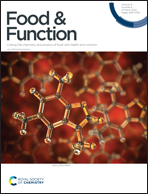Very-light alcohol consumption suppresses breast tumor progression in a mouse model†
Abstract
The relationship between alcohol consumption and cancer has no consistent results both in epidemiological studies and animal models. The inaccuracy of alcohol consumption dosage in the experimental design maybe leads to inconsistent results and makes the researchers ignore the effect of very-light alcohol consumption on cancer. To determine the effects of very-light alcohol consumption on cancer, in this study, the manner of gavage was used to control the alcohol consumption accurately. The impacts of age and time of drinking on cancer progression were also evaluated in this study. Here, we find that a certain range of alcohol consumption (from 0.5% w/v to 2.0% w/v) can suppress tumor development in the breast metastasis mouse model by controlling the alcohol consumption dosage accurately. RNA sequencing analyses were performed in primary tumors and related metastases from the NC group and 1.0% w/v group. The results of primary tumors and related metastases indicated that chronic very-light alcohol consumption downregulates breast tumor-associated oncogenes in primary tumors and regulates the immune system and metabolic system in metastatic carcinoma. To provide the public with drinking recommendations, eight commercial alcohol types were investigated at a dosage of 1.0% w/v. Two types of commercial alcohol, red wine (made in France, brand 1) and baijiu (made in China, brand 1), exerted excellent primary tumor and metastasis inhibitory effects. The untargeted metabolomic analysis of commercial alcohol by liquid chromatography-tandem mass spectrometry indicated that baijiu (brand 1) and baijiu (brand 2) exhibited a difference in compositions that can lead to their different anti-cancer effects. These results indicated that a certain range of very light alcohol dosages might have a potential human-cancer inhibition effect.



 Please wait while we load your content...
Please wait while we load your content...